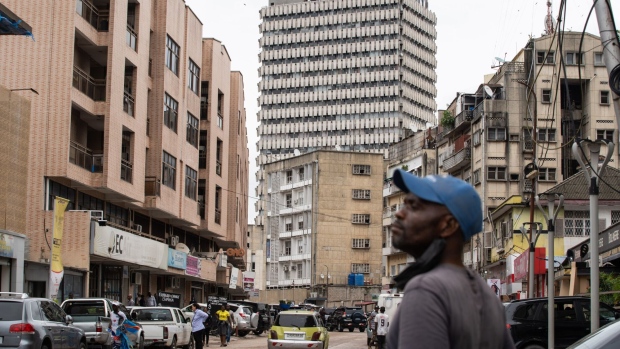Nov 24, 2023
Congo’s New Rules Could Force Banks to Sell Stakes of Up to 45%
, Bloomberg News

(Bloomberg) -- A directive from the Democratic Republic of Congo’s central bank has lenders in the country concerned they may need to sell stakes of as much as 45% within three years.
The order, known as Instruction 18, requires each of Congo’s banks to have at least four unrelated shareholders — including current owners — holding a minimum of 15% each in order to spread risk. This means most of Congo’s banks would need to sell a large chunk of their equity by 2026, according to to six people with knowledge of the directive.
The Congolese Banking Association, which represents the country’s 15 lenders, said its members were still reviewing the instruction “to ascertain the feasibility and implications of the proposed requirements.”
In recent years, Congo has become an enticing destination for lenders looking for growth on the African continent. While rich in minerals and other natural resources, the country has one of the world’s least-developed banking sectors.
Kenya’s two-biggest banks, Equity Group Holdings Plc and KCB Group Plc, have bought stakes in three Congo lenders.
Diversify Risk
Last month, the chief executive of Standard Bank Group Ltd.’s corporate and investment banking unit, Kenny Fihla, told South Africa’s News24 that Congo would be among the most important countries for the group over the next five years, barring unfavorable regulatory changes.
Now all three banks would need to relinquish shares of their Congo units if the central bank implements its order. KCB and Equity declined to comment, while Standard Bank said it was “engaging with the central bank, bankers’ association and stakeholders with respect to this recent directive.”
Officials from the central bank didn’t respond to multiple calls and messages requesting comment over the past month.
Several bankers who spoke to Bloomberg, most of whom asked not to be identified discussing the directive, said the regulator is concerned about the fragility of banks that don’t have a diversified shareholding.
But bankers are worried there won’t be enough reputable investors willing to enter the market. As the rules are currently worded, a development finance institution — like the World Bank’s International Finance Corp. — could only invest in a single bank, the bankers said.
“It doesn’t take a genius to see it means 45% of the Congolese banking market is up for sale and they have three years to sell it,” said Henry Wazne, chief executive officer of closely held Sofibanque SA, Congo’s fourth-biggest lender. “If all of the banks start going on the market and looking for investors, that will depreciate our assets.”
While several of the bankers told Bloomberg they didn’t believe the central bank could enforce the directive, some are already taking steps to comply with the order.
Nigeria’s Access Bank Plc “is studying the new regulation with a view to ensure compliance far ahead of the effective date of the regulation,” said Seyi Kumapayi, its executive director for African subsidiaries.
FBN Holdings Plc of Nigeria also committed to complying with the regulations and said it was “exploring all our options.” Citigroup Inc., which has a small unit in Congo that clears most of the country’s dollar transactions, declined to comment, as did the country’s largest lender, family-owned Rawbank SA.
--With assistance from Adelaide Changole, Emele Onu and Bella Genga.
©2023 Bloomberg L.P.






